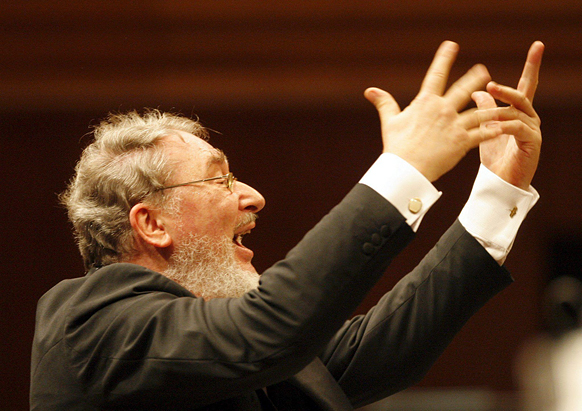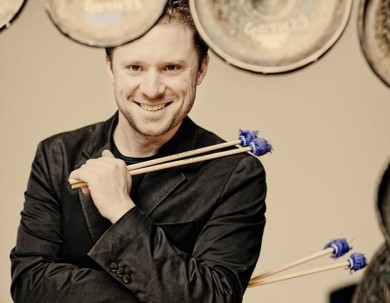Colin Currie provides the highlight in New World’s program of contemporary German music
The New World Symphony’s first “Sounds of the Times” concert of the season offered a sampling of 21st-century works by Austrian composers from the catalogue of music publisher Boosey and Hawkes. HK Gruber, one of the founders of what has been dubbed ‘The Third Viennese School’ was on the podium on Saturday night for two American premieres and a neo-Romantic work that recalled the Vienna of a previous century.
Gruber is best known for his ironic and hugely entertaining quasi-cabaret song cycle Frankenstein!, which he performed with the New World in 2006. The US premiere of into the open… for percussion and orchestra displayed another, more sober side of Gruber’s musical persona.
In his introductory comments, Gruber emphasized that the score is not a concerto or display piece. Still the huge array of percussive instruments spread across the front of the New World Center stage tested the speed, agility and musicianship of soloist Colin Currie.
One of the hallmarks of third school Viennese composers is the blending of both atonal and more melodic traditions. When Gruber was writing the score in 2009, he was informed that David Drew, a British music journalist and his editor and chief promoter at Boosey and Hawkes, had died. That influenced the remainder of his composition which veers heavily into atonality. Gruber manages the stylistic cross-pollination and emotional volatility of this single-movement work with skill and formal rigor.
The score opens with a solemn processional. Spare fragments are registered on gongs, marimba, xylophone and blocks, supported with an undercurrent of pedals from the ensemble to form a tone row. This quiet, almost trancelike music is interrupted by harsh brass interjections which set off rapid volleys and rhythmic surges on the timpani, drum set and bongos. Gruber’s complex orchestral writing almost breaks into dance rhythms at times. A big brassy climax is followed by a drone-like fade out from both percussionist and ensemble for a striking and poignant conclusion.
As in his previous Miami appearances with the Cleveland Orchestra and New World, the formidably gifted Currie shoed himself an absolute master of his instrumental battery. He could draw the most delicate of sounds from the instruments as well as thunder that carried above the full orchestra. Currie’s keen musicianship and sensitivity to the work’s darker textures complemented Gruber’s strong delineation of the instrumental writing. He received an ovation marked by cheers and a standing ovation.
Bernd Richard Deutsch’s Mad Dog was not only an American premiere but the first U.S. performance of any music by the composer. Scored for 17-piece chamber orchestra, this three-movement 2011 work is very busy and frequently loud. The trumpets, trombone and tuba make growling sounds and there are shrieks and a whistle (played by a percussionist) amid the din. The score’s best moments come in the solo writing for harp and prepared piano. Lasting 20 minutes, the work runs out of fresh ideas very quickly and becomes a rather dour exercise in loud and louder volume gradations. Along the way there is an absence of leavening wit.
In a video introduction to his Nachtmusiken, Kurt Schwertsik metaphorically said he frequently meets Brahms in Vienna and indeed the romantic spirit pervades the 23 minutes of this five-movement suite.
Schwertsik prominently utilizes an accordion, particularly in the second movement “Wienerlied” which is a sentimental melody dipped in Viennese schmaltz. Mahlerian angst shadows the big melodic passages of “…for David Drew” (who was also a mentor to Schwertsik). More than a little Prokofiev-Love for Three Oranges sarcasm is heard in the “Fast March.”‘ The final movement “Flight” is a neo-Baroque ricercare dominated by the strings with elegant thematic permutations for the winds. Schwertsik’s work falls somewhere between a film score and an upscale pops piece but it is well crafted and an audience pleaser. Lustrous string playing highlighted a strong ensemble effort.
The New World Symphony’s Sounds of the Times series continues with Reinbert de Leeuw conducting 7:30 p.m. April 15, 2017 at the New World Center in Miami Beach. The program includes de Leeuw’s Der nächtliche Wanderer and Kaija Saariaho’s Graal théâtre with Joseph Puglia as violin soloist. nws.edu; 305-673-3331.
Posted in Performances, Uncategorized
Leave a Comment
Sun Dec 4, 2016
at 2:54 pm
No Comments








